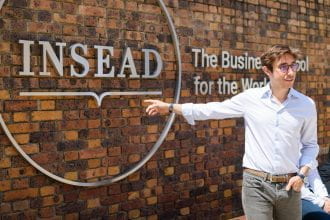INSEAD is making a concerted effort to help more talented men and women from Africa reach their leadership potential
When it comes to diversity in an MBA programme, INSEAD is unparalleled. With more than 80 nationalities represented across its three campuses, INSEAD consistently earns the title of most diverse business school in the world.

And yet, INSEAD recognises that there is still room for improvement in the diversity of its students. Most notably, African men and women are not ideally represented in the MBA Programme.
“When you look at where our students come from, Africa is still seriously underrepresented,” says Minh Huy Lai, managing director of INSEAD’s MBA Programme, who points out that only 4.3% of students from the current MBA class come from African countries. One of the main barriers is the MBA Programme’s €80,800 price tag, making it cost-prohibitive for many African students.
“In Africa, those who make significant Western-level salaries are few and far in between,” he explains. “When an African student goes to their bank for a loan, the banks demand guarantees. Unless the student comes from a rich family, to guarantee a €60,000 or €80,000 bank loan is a massive endeavour.”
INSEAD is making a concerted effort to address this problem by increasing funding through scholarships. With the generous support of donors, the school has recently unveiled a series of new scholarships specifically designed to help students from Africa pay for the MBA Programme.
Funding the next generation of African leaders
One of the newer scholarships is the The Pot Family Foundation Scholarship, a full-tuition award for a student from Africa. Created by Wiet Pot MBA’82 and his wife Carien, the scholarship will be granted for the first time to a South African student in the MBA’18J class
“Our family has spent a fair bit of time in parts of Africa over the last five years, and we love the spirit of the people, the unrivalled beauty of the continent and observed its potential but also seen the challenges,” says Wiet. “Capable and well qualified leaders in business are and will continue to be important stakeholders in making the transition to fairer and more prosperous societies and it is for that reason that we feel privileged to support talented individuals from all over Africa to participate in the MBA programme at INSEAD.”
Another notable scholarship is the INSEAD MBA’75 Nelson Mandela Scholarship, which honours the life and work of President Mandela of South Africa. The MBA Class of 1975 created the endowment at their 30th Class Reunion to provide financial support for one or more African participants per year at INSEAD in perpetuity. It was the first scholarship for Africans at INSEAD.
Candidates from Africa can also apply for the Olam International MBA Scholarships for Change Catalysts in African Markets, the Renaud Lagesse ’93D Scholarship for Southern and East Africa, the Class of ’65 Scholarship, the Class of ’67 Scholarship, the MBA Scholarship for Mauritius, the Greendale Foundation Scholarship and the Sam Akiwumi Scholarship ’07D.
INSEAD is also investing in scholarships for Africans. In 2016, the school launched the Africa Leadership Fund. The €50,000 award recognises African candidates who demonstrate outstanding professional and personal achievements, leadership experience, and growth potential.
Developing agents of positive change
This funding endeavour is about more than just enriching INSEAD’s classroom environment through diversity. It also affirms INSEAD’s desire to shape the development of African talent so they can use business as a force for good—specifically by utilising businesses to help African economies thrive and lift millions out of poverty. INSEAD wants to develop thoughtful, responsible leaders who will be agents of positive change in their organisations, communities and the broader world.
“Africa is developing, and the growing economies and companies need talent,” says Minh. “With our mission of being the ‘business school for the world,’ it’s appropriate that we help support talent from Africa.”
INSEAD is also motivated to shrink the educational gap in Africa. While incremental change is happening in most African countries in primary and secondary education, there is still an unmet need for higher education. INSEAD believes that a world-class business education is one of the best ways to connect talented African men and women to leadership roles that will help change this reality.
These efforts are already showing results. Topyster Muga MBA’12J, who serves as senior director of financial inclusion for Sub-Saharan Africa at VISA, credits the Nelson Mandela Scholarship she received to attend INSEAD to her success.
“INSEAD has been a life-changing experience for me, a great turning point to whom I am in life,” she says. “I probably wouldn’t have been able to access this education if I hadn’t been awarded this scholarship.” (She shares her story in this video.)
For Aly Madhavji MBA’16D, INSEAD scholarships have provided the chance to achieve his goal of improving higher education in Africa. A child of refugees from East Africa who fled during the Idi Amin dictatorship to Canada, Aly says he wouldn’t have been able to afford to attend INSEAD without the awards.
“My goal is to return to Africa and help develop the higher education system in the continent in order to create opportunities for young leaders to transform societies,” he shares. “I’m currently working with Education for Sub-Saharan Africa on this mission on numerous transformational projects.”
Scholarships are a tool that change lives, says Marlon Bowman, MBA’15J, who serves as growth head of value banking solutions at FNB South Africa. “Without a scholarship, I would not have attempted any MBA overseas, let alone INSEAD. It is a great fork in the road of my life.”
The awards create opportunities that can have a great impact on the continent, says Tinashe Mukogo, MBA’16D candidate from Zimbabwe, who serves as finance excellence programme associate with next47. “For an African student, the advantage of an INSEAD MBA is that it places you leagues ahead of your peers,” Tinashe explains. “If we measure this advantage, it would be greater for us than for students who live and work in Europe. When INSEAD selects a student from Africa, that person is likely to be at the top of their community, hence you find that the potential to create impact is actually much larger.”
Other notable alumni from Africa include Tidjane Thiam MBA’88J, CEO of Credit Suisse; Andrew Alli MBA’95D, President and Chief Executive Officer, Africa Finance Corporation; Lucy Quist MBA’05J, CEO of Airtel Ghana; and Josephine Thomas EMBA13Dec, CEO of The Uganda National Oil Company, amongst others.
More initiatives at work
INSEAD is developing other initiatives to increase its visibility on the continent of Africa. For example, its team of MBA recruiters is spending more time travelling across Africa to meet prospective students and working to build relationships with young African citizens who are working or studying in Europe.
“A lot of young African talents are found in Paris, London, Brussels and Switzerland,” explains Minh. “They tend to be younger undergrads, so we’re reaching out to help build the pipeline for the long term.”
INSEAD is also turning to alumni to help. As the alumni network spreads across the globe, INSEAD is asking alumni in African cities to consider hosting events paid for by the School so local prospects can meet alumni. Minh often invites alumni to email him personally to recommend and refer high-potential African candidates they know, whether they’re colleagues, family members, or friends.
INSEAD hopes the unique value proposition it offers will attract African students. “For an African that is looking for an international education, I believe we would provide him or her with a more well-rounded worldview,” Minh says. “They’d be exposed to a broader set of students from all around, both during school as a student and after school as an alumnus. It’s a much more enriching network.”


